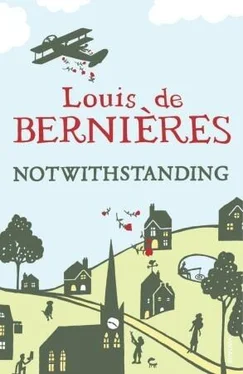Alan is out on the vegetable patch, digging deep rows and turning dung into the trenches. His wellington boots are clogged with manure and rich earth, and he has a blackbird, a mistle thrush and a robin in attendance. He tosses them worms in turn, but each time they pounce and squabble. Alan is weary, his back and thighs ache from his work, and he is longing for his meagre honey sandwiches. He pauses often, hoping for rain that is too heavy to work in.
John is glad of a young man to break the soil. He has been gathering golden-skinned passion fruit from the house front and the trellises, and now he is back in the shed, talking to George. ‘A whole basket,’ he gloats. ‘What about that, then? Harvest of a good long summer. Bluebottles for you, passion fruit for me, God’s in His heaven, all’s right with the world. Makes you believe, though, doesn’t it? Lookin’ at a passion flower. That purple, and that bit o’ yellow, and that white. And those tendrils that won’t let go. And leaves like dark-green hands. And the funny stamens with wobbly crosspieces on top. Looks as if it’s made by Him Above in a good mood. I suppose that if you’re a spider, then you think that God is too. That would explain the number of bloody insects, any road. Wonder where Sylvie is. I’ll tell you something else, Georgie boy; I reckon he fancies her as much as she fancies him. And another thing. I’m jealous. Sixty-seven year old, and I’m jealous.
‘Ridiculous, that’s what I am. Don’t suppose you think about such things, eh? Build yourself a sticky little web and sit back and reckon that you got it sorted. All right for some.’
A sharp wind springs up, and those outdoors shiver and look up at the sky, which darkens suddenly. Thunder roars overhead. A torrent commences, as if a giant has overturned his bath, and Alan rushes into the shed. John is pleased with himself. ‘Said it would rain, didn’t I? Was I right? I certainly was.’
‘You’re always right,’ says Alan. ‘Bloody weathermen, though. I didn’t bring my waterproofs because of them.’
‘You’re gullible, you are,’ says John, still pleased about the accuracy of his prognostications, pleased that he knows a few things that Alan will never know, even if he goes to university. ‘Put the kettle on, boy, and make some for Sylv.’
The kettle begins to hum, and Alan ladles tea leaves into the pot, which is so ingrained with tannin that its original cream-coloured interior has become completely brown. Like all respectable gardeners’ teapots, it has a chip out of the tip of the spout, and the lid has broken in half and been glued back together.
‘I think I could mend that door,’ says Alan. ‘The pins through the hinges are worn out. I could probably replace them with sawn-off six-inch nails.’
John is smoking his pipe and enjoying the feeling of being warm and safe inside while outside the world is drowning. ‘Bright lad,’ he says, ‘but mind you don’t go disturbing George.’
‘One of the threads goes to the back of that hinge,’ says Alan, scrutinising a long thread of gossamer that glistens with dust. ‘Christ,’ he exclaims, instinctively ducking as the thunder crashes directly overhead. He opens the door to observe the deluge, and the lightning crackles again. The thunder unrolls instantaneously, and Alan is excited. ‘What a corker. Cor, did you see that? Right overhead. It’s amazing, the rain’s actually bouncing on the ground.’
John is being knowing again, as is his right as an older man, and a countryman. ‘When it rains like this, we get a flood. I told that pop star and the Shah of Iran, and I’ve told Mr Gull ’n’ all, I said, “We need a gulley along the drive, ’cause it’s clay here, and the water sits and sits before it soaks away.” Anyway, that pop star feller only knew how to say “Far out”. No, I lie, sometimes he said, “Heavy, man, heavy.” He died in the end, did I tell you? Choked on his own vomit, so they say, somewhere in America. Anyway, the Shah just says, “We’ll do it, God willing,” and then his country got all political, ’cause things were happening over there, see? And Mr Gull just says, “I’m considering it,” and while he’s considering it, we get wet.’
‘Hi, boys,’ cries Sylvie exuberantly, as she lunges in through the doorway, her hair lank and dark with water, which is also dripping from her eyelashes and the end of her nose, which has gone pink about the edges of her nostrils. ‘God, it’s raining cats and dogs, horses and donkeys, giraffes and elephants. I’m absobloodylutely soaked. Shelter, you’ve got to give me shelter. If I try for the stable I’ll drown.’
‘Sorry, Sylvie,’ teases Alan, ‘John doesn’t hold with women in the potting shed.’ He pretends to be about to push her back out into the rain.
Sylvie takes her long hair in her hands and wrings out the water. ‘He’s an old sweetie, really, except that he deceives his wife.’
John’s eyebrows jerk upwards. ‘You little scamp. I never did.’
‘You did too. You told me yourself you’ve had that motorcycle and sidecar for thirty years, and your wife doesn’t know. Seriously, Alan, he keeps it in someone else’s shed, and his wife thinks he comes to work on the bus. He’s got no principles at all.’
John rolls up his newspaper and takes a playful swipe at Sylvie’s head. ‘I won’t be trusting you with any more secrets. Rapscallion. Anyway, a man needs secrets from his wife. Keeps him normal, keeps him sane. It’s privacy.’
Spontaneously, Sylvie plants a kiss on the top of John’s head, and he beams with embarrassment, pride and pleasure. She says, ‘I used to come in here when I was a kid, and he’d sit me on his knee and tell me stories.’
‘You used to pull my moustache and say, “Is it real? Is it real?” There’s water in the kettle, new boiled, by the way. D’you still take four sugars?’
Sylvie reproves him. ‘Oh John, I gave that up five years ago.’
A small white paw hooks around the bottom of the door, attempting to open it, and Alan says, ‘It’s Rover.’
‘Oh poor pussycat,’ says Sylvie, ‘I’ll let her in. She’s soaked, poor little thing, she’s pathetic.’
The cat is bedraggled, and frightened of the thunder. She is shivering and miaowing silently, her jaws opening and closing with poignant eloquence. John leans down and heaves her on to his knee, where he dries her with sacking. The cat purrs, and John explains, ‘She likes that, she does.’ The cat settles, drawing warmth from John’s thighs, and all of them sit in agreeable stillness, lulled by the purring, by the sounds of the rain, and the sipping of tea.
‘This is nice,’ says Sylvie, at last, ‘all together in the shed, safe and warm.’ A stray thought occurs to her, as stray thoughts do. ‘I’ve been meaning to ask, what do you boys do when you need a wee? I mean, you never use the stable loo, do you?’
John looks at her a little mischievously. ‘Compost heap. No point in wasting it. Nitrogen, see?’ and Alan adds, ‘It was one of John’s conditions of employment when I came up looking for a job.’
‘There’s water coming under the door,’ observes Sylvie, nodding her head towards a puddle by the threshold.
‘Might have to sit on the table. Can’t stand wet feet,’ grumbles John. ‘My old man, he got trench foot in the war, the first one, and he always told me, “Don’t never let your feet get wet. They’ll go white and spongy, and then the meat falls off.” It’s like when you leave a piece of chicken in a bowl of water. Bloody horrible.’
A whimsical idea occurs to Sylvie. ‘Does this shed float? I mean, we could be like Noah’s Ark. With the cat and everything.’
‘And George,’ adds John, in the spirit of fairness.
Читать дальше












